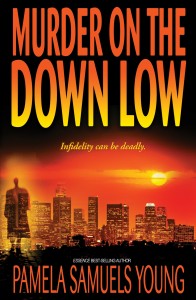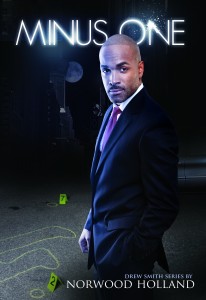A Conversation with Brian Boger
January 17, 2014
When I first picked up Southern Fate I thought because the author was an attorney it was just another legal thriller, but the opening didn’t neatly fit into the thriller formula. I read on thinking perhaps it was a mystery but the first body didn’t show up until Chapter 9. Obviously not a mystery, so I read on and suddenly it swept me up and blew me away like a hurricane. The genre was literary and quintessentially Southern with elements of both mystery and thriller. The novel centers on the inner story of a South Carolina attorney Frank Rhodes and the journey to his fate and fortune.
Introduced as a rather pathetic character Frank Rhodes is an accident prone klutz and a mediocre lawyer whose only passion is hunting and fishing. The only thing making him worthy of attention is his extreme good looks. Suddenly things change for Frank in a big way when he lands a windfall judgment instantly propelling him into the national spotlight. On the road to money and fame he soon learns the bad news his wife is leaving him for another women. And things get complicated quickly when a serial arsonists plaguing the city with one of the first victims being a member of Frank’s non-traditional family. Meanwhile his brother teaches him an unorthodox method on how to get develop rhythm to thereby overcome his clumsiness, a lifelong affliction.
There is much going on in Southern Fate with numerous subplots. The book is full unexpected plot twists and Boger takes the reader into areas past traditional Southern writers feared to tread. He incorporates several popular motifs commonly found in Southern literature including sense of family and sense of place. However we see some newer motifs developing. For example the non-traditional family and same sex relationships. At a young age Frank’s father was killed by a burglar. His mother and another single windowed mother with a son of similar age merged households to form a non-traditional family headed by two women. While these women are heterosexual another non-traditional family with young children taking root when Frank’s wife leaves him for her same sex lover with young children. These types of non-traditional modern family models are uncommon in traditional Southern literature but realistically capture today’s society. Lesbian relationships have rarely been openly presented in such openly fashion and again capturing the dynamics of today’s modern families.
Another traditional motif is the sense of place. Southerners are exceedingly proud of their region and as social historian Carl N. Degler once described the South as a region “where roots, place, family and tradition are the essence of identity”. All of which are apparent in Southern Fate which in this jet age moves from Columbia to Charleston, New York, the Bahamas and Costa Rica. However, make no mistake the stories beginning, middle, and end are deeply rooted in Columbia, and Boger does not spare the details of Columbia’s rich Civil War history recounting the tales of Sherman’s march. Indeed the ghost of the War against Northern Aggression and the horrors Columbia faced under Sherman conjures up a deus ex machina villain the serial arsonist. Like Bo Radley suddenly arriving on the scene and not a moment too soon.
This is perhaps the books one major shortcoming. We never get to know the villain or his motivations only that he has targeted women belonging to the Daughters of the Confederacy in the name of Sherman. There are no red herrings or clues to suggest anything about the character and his motivations. The villain emerges in the end and disappears in a puff of fire and flames. As a reader in the end I was left frustrated with too many questions as was Frank. Perhaps this was the author’s intent.
As social issues and politics evolve with time so does a society’s literature, and Southern Fate stands as an exemplary work of modern Southern literature. The author is a practicing attorney, the father of three. He and his wife live in Columbia where he studied law. He also holds a degree in English from the University of Virginia. Brian Boger pushes the boundaries and thereby expands the conventional motifs placing him among the vanguard of new Southern writers.
I would dare suggest being on the future lookout for Brian Boger. He expects to release his second title in 2014. When asked about the project, he says “the working title is Champagne Friday. It’s another legal thriller type book with some (surprise) literary themes like loss, redemption, vindication, and young men leaving their Bacchanalian Rite of Passage behind them for good women. It’s a humdinger of a book developing strong female characters appealing to a broader female audience. The women are cool.”
If the women are anything like the men of Southern Fate it should indeed be a humdinger. Southern Fate is an incredibly delightful read, rich with local color and chocked with quirky characters. Boger’s voice and style are a cross between John Gresham and John Brendt. The state capital Columbia might want to get behind their adopted favorite son because Southern Fate could very well do for Columbia what Midnight In the Garden of Good Evil did for Savannah.
Mysticism in Latino Writing
November 20, 2011
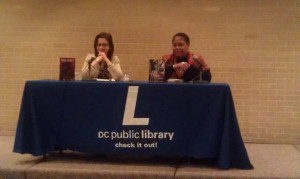
The MLK Library presented a Saturday afternoon book discussion on Mysticism in Latino Writing featuring authors Lyn Di Iori and Dahlma Llanos Figeroa. The authors discussed the role of mysticism in their novels. Lyn Di Iori’s Outside the Bones and Dahlma Llanos-Figueroa’s Daughters of the Stone are both receiving rave reviews. Iori’s Outside the Bones is an erotically charged ghost story set in both present-day New York and Puerto Rico. Praised as her brilliant debut novel it takes a mesmerizing look at issues of race, class, power and greed with Afro-Caribbean witchcraft rituals deftly woven through a sixteen year mystery unraveling a woman’s disappearance.
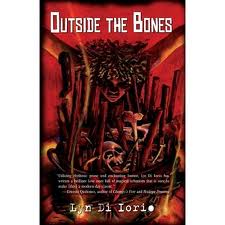 Figueroa’s Daughters of the Stone follows a sacred stone handed down five generations used to invoke mystical powers and rituals of the old ones. A rich sensual tale of mothers and daughters, love and sorrow, hardship and pride the novel through conjuring up the spirits renders a magical, deeply real, and vividly told story surrounding diasporic people.
Figueroa’s Daughters of the Stone follows a sacred stone handed down five generations used to invoke mystical powers and rituals of the old ones. A rich sensual tale of mothers and daughters, love and sorrow, hardship and pride the novel through conjuring up the spirits renders a magical, deeply real, and vividly told story surrounding diasporic people.
Both authors of Puerto Rican descent have chosen to raise the voice of the American Latina, half of the nation’s largest growing ethnicity, a segment of our culture not often heard. The powers of the Santeria, a religious practice with its African origins and Catholic influences and Puerto Rican spiritualism lie at the heart of both novels. Highly talented both authors continue a renaissance of award winning Latina writers exposing an American experience so long overlooked.
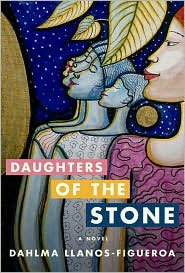
It has been said “Latina writers are powerful and seductive in their works. Their writings encompass the feelings women have in different situations, from dealing with a male-dominated society to family relationships.” No doubt the same can be said of the works of Iori and Dahlma. After readings the discussion ended with the interested patrons peppering the authors with questions about their themes, writing habits, and the Puerto Rican experience.
MLK Librarian Kathy Jenkins ended the program enthusiastically promising future similar author events. MLK Library and MahoganyBooks partnered in producing the program with the support of More Than Words (www.morethanwordsliterary.com) and Go On Girl! Book Club and Las Comadres.
The Colored Section of Bookstores
September 20, 2011

by Yolanda M. Johnson-Bryant the founder and CEO of Bryant Consulting. Her consulting firm provides a variety of services to new and established writers, including ghost writing, manuscript editing, character development, and marketing. See YolandaMJohnson.com
and LiteraryWonders.com
African-Americans have come a long way in the literary industry. More and more black authors are emerging onto the markets, be in via traditional publishing or self-publishing. This is good news to our authors and readers, but we have to admit—we have a long way to go.
As authors, we have made our mark in bookstores. Let me correct that—non African-American bookstores. Now, when a patron walks into a bookstore such as Borders, Barnes and Noble or even Wal-mart, a reader can find our section with ease; the “colored section” if you will.
No, this is not about race—not necessarily. This is more so about activism. Should our books have their own section in bookstores? Yes and no. A consumer should be able to walk into a bookstore and browse bookshelves by genre like they can any other book. By doing so, would close yet another notch in the belt of segregation.
However, the reality is that a lot of African-American authors would lose out if this was to happen; right now at least. Currently, when a reader learns of a new book by their favorite author, or a new author, it is so easy for them to head straight to the “colored section” to find the book they are looking for, and even then, there is no guarantee the book will be available.
Another frustrating factor of the “colored section” is the lack of variety of our books and the lack of quantity. Many bookstores may confine AA (African-American) books to one kiosk, or at best, a two-sided book shelf or corral. I often wonder how African-Americans would feel if this section was larger. Would we complain about the segregation of our books then? Perhaps so; but I get the feeling that there would be less complaints about the section, and more complaints about something else.
Could it be that African-Americans cringe at the thought of actually having to socialize amongst the proper folk and subject themselves to something outside of their comfort zone? This could be it, or perhaps another factor could be that we don’t want to take the time that it would take to saunter somewhere other than the “colored section” to find the book we are searching for. I’d say that all of the above might be true.
Earlier, I mentioned that this was not a matter of race but activism. Bookstores don’t get a free pass when it comes to the part they play in the “colored section” because they are guilty, guilty, guilty! Contemplate this: Just like we made our presence known in the literary industry, we can also make our presence known in bookstores and make our voices heard. Everywhere you look, there is a campaign for this or a campaign for that. Why not start a campaign to either make the “colored section” larger and with more variety or mixing our titles amongst the “house books” if you will.
Talk to your local bookstore managers and associates, write letters, start a Facebook page—something other than Like Me if You Like My Farmville Page. Let’s also hold publishers accountable for joining forces with authors and readers so we can do something about that little violation problem in bookstores. African-Americans will boycott a local restaurant because they didn’t have catfish on the menu, but won’t boycott a bookstore so that our books will have a better presence in their establishment.
By doing this, we challenge our readers to come in from the cotton fields and mingle in the country club, and at the same time, expanding our horizons. As African-Americans, we can no longer sit about and complain about things and do nothing about them. With the takeover of e-books and the closing of bookstores, our books will be diluted in the process. Take action or kindly put up your Baptist finger and excuse yourself.
Pamela Samuels Young
March 24, 2011
Murder on the Down Low opens at the funeral of Maya Washington. Mourning are her close knit girlfriends. Maya died of AIDS infected by her down low fiancé, Eugene Nelson. Her cousin Special Moore full of vengeful grief makes a scene vowing to make Eugene pay. Among this circle of girlfriends are two attorneys and a detective each with their own work place challenges. Special with the group’s help persuades Maya’s mother to bring a wrongful death action against Eugene. Meanwhile a serial killer is targeting down low professional African American men. Special in her uncontrollable grief mounts a campaign of harassment stalking Eugene. The wrongful death suit takes a turn for the worst when Special is charged as the suspected serial killer against a mountain of circumstantial evidence. Attorney Vernetta Henderson takes the lead as the girlfriends set out to prove Special’s innocence.
Anyone who enjoys the company of sophisticated ladies will love Vernetta Henderson and her crowd. Pamela Samuels Young sketches various recognizable female personalities and their friendships while painting a faithful portrayal of the men who love them. The author has mastered the fictional technique of raising the stakes with unexpected plot twist and turns. In this moral story of tolerance and understanding a seemingly unrelated series of events keeps the reader wondering on the edge of their seat while the author mixes up a mystery package tying it all together in a neat little bow like denouement.
Young self-published her first novel Every Reasonable Doubt establishing her own imprint. She told me she self-published her first novel hoping to be picked up by a major publishing house. Three block buster Essence Best Sellers later, that is no longer of interest. Who needs the powerhouse publisher or agent? Certainly not this author, Pamela Samuels Young is proving to be a self-publishing force.
Editors, publishers, and agents, the industry shakers and movers, the gate keepers sometime get it wrong ignoring certain talent and marketability as often the case with African American fiction writers who resort to self-publishing. We saw it with Omar Tyree, E. Lynn Harris, Mary Morrison and others time and again. Young is the latest in a long line of African American writers going against established industry trends. Thanks to the Internet writers like Pamela Samuels Young rise to success no longer limited by the subjective taste of a small few.
Congressional Hearings on Islamic Terrorization
March 11, 2011
They can’t win on the issues so they run on fear. New York Republican Congressman Peter King’s attempts to demonize Islamic Americans didn’t draw the reaction he intended. The campaign pitching fear on a theme of Muslim American radicalization was met with backlash. Of the 7 witnesses only one represented law enforcement. A dramatic moment came when Rep. Keith Ellison (D-Minn.) one of only two Muslim Congressmen was overcome with emotion as he concluded his testimony referencing a Muslim paramedic Mohammad Salman Hamdani who died heroically responding to the World Trade terrorist attacks of Sept. 11, 200l. Ellison met with Hamdani’s mother before the hearing.
It seems Americans never learn. The Congressional hearing on Islamic Radicalization was an attempt at the same fear mongering and spread of misinformation seen too often in American history. Senator Joseph McCarthy stoked fears of communism with his hearings in the 1950s thus coining the phrase, McCarthyism, making accusations of disloyalty, subversion, or treason without proper regard for evidence. We saw the same fear mongering when the Japanese were rounded and placed in detention camps. And when Chinese men were deported without due process while enduring a century plus of racist framing and large scale discrimination. Blacks, Latinos, and now Islamic Americans have all come under this type of attack with prevailing stereotypes and discrimination, and misinformation.
While Republicans ignore history using the same old playbook, it would behoove Americans to remember and pay attention. Smith’s hearing might have been better served inquiring into all home grown terrorism rather than trying to demonize one ethnic group. Why are anti abortion activist bombing clinics and assassinating doctors? Why are White Supremacist organizations infiltrating the Tea Party or planting a roadside bombs along a MLK parade route? Congressman King chose to discredit non-Muslim acts of terrorism, including hate crimes.
The Washington Post Fact Checker assigned two Pinnochios to Peter King’s facts, meaning: Significant omissions and/or exaggerations and possible factual errors. A politician can create a false, misleading impression by playing with words and using legalistic language that means little to ordinary people.
Voters take heed. The Republican playbook is getting old. Unfortunately the same old plays still work: lies and disinformation without evidence.

